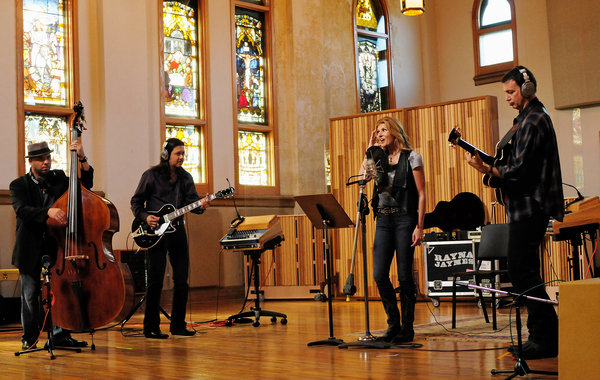A recent article in the online journal Religious Dispatches discusses the Southern Christian presence, or lack thereof, on the hit television show Nashville. In an intriguing analysis, writer Carrie Allen Tipton points to the popular “spirituality” the show displays instead of the evangelical piety one would expect to find in a program situated in the Bible Belt and devoted to the culture of country of music. Perhaps the a-religiosity of the show can be attributed to the presumed proliferation of the unaffiliated—the “nones” so visible in the press of late. In any case, church going, if it is mentioned at all, seems a matter of nostalgia for Nashville’s leading characters. The church choir of long ago is recalled with affection, but those sacred precincts of yesteryear have been replaced for the show’s heroes with new sanctuaries: the Bluebird Café, in particular, and the famous Ryman Auditorium.
Tipton suggests that the most cherished value advanced by the show is a country kind of “authenticity.” There are those who sell out to the industry and then there are those who dedicate themselves to the craft of songwriting, thereby enacting the watchwords “to thine own self be true.” Of course, being true to one’s self comes at a significant cost—as demonstrated by the character Deacon Claybourne, played by Charles Esten. Deacon has had a lifetime of hard knocks and empty bottles. But his guitar has accompanied him through it all and so he has been able to transform misery into minstrelsy while also serving as, well, a deacon to some of the young musicians on the show. (Steve Earle embodied similar tribulations and virtues as street musician Harley Watt in the HBO drama Treme.)
At the other end of the spectrum is Juliette Barnes, played by Hayden Panettiere (who, in her previous TV role as Claire Bennet on the program Heroes, held the key to humanity’s salvation: “save the cheerleader, save the world”). Juliette is the purveyor of pre-teen pop. She will do whatever it takes to get to the top and stay there. She suffers a fall from favor, however, when the press publicizes her home-wrecking affair with a popular philanthropist and (former) poster-boy for marital fidelity. In response to a detractor’s invocation of God’s wrath upon her, Juliette declares: “There is no God who would listen to a crackpot like you.” This theological assertion, dutifully captured on somebody’s recording device, appears almost instantly on the web—with the qualifying clause about the “crackpot” edited out. Julia’s partial confession, “There is no God,” goes viral and suddenly the Southern Christian presence does assert itself into the show. Her former followers declare Juliette a blasphemer; they heckle her, burn her records, and boycott her shows.
Here at last, perhaps, is the kind of religiosity critics expects from country music fandom. Ironically, Juliette decides not to orchestrate a heartfelt confession and apology to the base in order to get back into their good graces. Instead, after she visits a church and says a little prayer, she gets together with chastened bad-boy, Avery Barkley (Jonathan Jackson), to write a new song. Then, during her induction into the Grand Ole Opry—”the Mother Church of Country Music,” as she calls it during the ceremony—Juliette debuts her own defiant anthem to authenticity: “Don’t Put Dirt on my Grave Just Yet.”
That little prayer in the church by Juliette complicates the analysis Tipton advances in her Religious Dispatches article. If Nashville is renewed for a third season, there may still be occasion to make more complex the depiction of religion in this engaging show.
